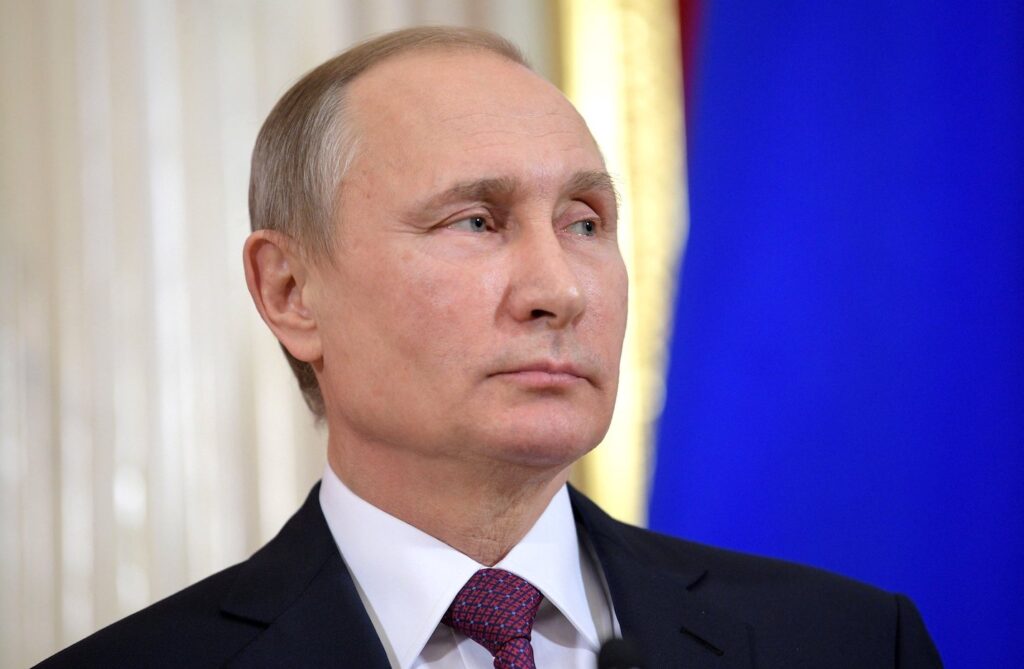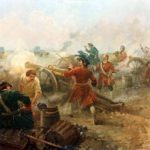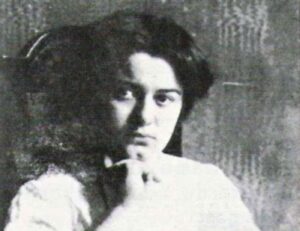When, in 2001, George W. Bush looked Vladimir Putin in the eye, he found him “very straightforward and trustworthy.” Nearly two decades later, the former president amended his account, saying that Russian oil riches had “changed” Putin. Another possibility does not seem to have occurred to Bush. Perhaps, in 2001, he looked into the eyes of someone consummately well-trained at dissimulation.
One might make a strong case that deep insight into Putin’s character requires profound knowledge of the social system from which he emerged, that is, the totalitarian police-state that was the USSR. In Gaila Ackerman and Stéphane Courtois’s 2022 Le Livre noir de Vladimir Poutine (which translated is “The Black Book of Vladimir Putin”), we find a considerable quantity of such insight.
This book, a collection of essays from scholarly experts on Russia and the former Soviet Union, comes at an especially important moment, as many on the religious right have become enamored of Putin’s supposedly Christian leadership of Russia. The Black Book of Vladimir Putin hews close to the facts and shows that any pretense to reality cannot deny that Putin’s regime is brutal, deceitful, corrupt, and unworthy of even mild admiration.
This book comes at an especially important moment, as many on the religious right have become enamored with Putin’s supposedly Christian leadership of Russia.
Start your day with Public Discourse
Sign up and get our daily essays sent straight to your inbox.Putin: Homo Sovieticus
One of the two co-editors, Stéphane Courtois, is perhaps the world’s foremost historian of the Bolshevik revolution and Soviet communism. He is the main editor of the international bestseller, the title of which is played on in this current book, The Black Book of Communism. He is also the author of perhaps the finest biography of Lenin produced to date.
One of the central contributions Courtois has made to our understanding of Soviet society is the breathtaking scale of its moral corruption and the human costs that were a consequence of that condition. The Black Book details the gruesome quantitative data representing athe tens of millions of innocent human beings the Soviet machine-plowed into the ground.
This scholarly expertise makes Courtois an extraordinary analyst of Putin. The several chapters in this book that he authors or co-authors with co-editor Galia Ackerman are full of brilliant insights into the complicated business of understanding Putin, based on studying the forces that produced him. In Courtois’s view, the Russian strongman must be understood as an example of “Homo sovieticus,” a political personality irrevocably formed by his decade-and-a-half career, begun as a young man, in the stupendously brutal and amoral bureaucracy of the KGB.
The Soviet regime is formally gone, but the legacy of its formidable security apparatus lives on. There was never a “decommunization” process in the wake of the USSR’s collapse. The vast majority of those who had participated in its structures and atrocities escaped punishment, and many of them created political careers in the post-communist era. One sees this with clarity in people like Putin who were deeply marked by their socialization within that apparatus. One of the Ackerman/Courtois chapters is aptly titled “The KGB returns to power,” and another “Vladimir Putin’s headlong rush to the past.”
In Courtois’s view, the Russian strongman must be understood as an example of “Homo sovieticus,” a political personality irrevocably formed by his decade-and-a-half career, begun as a young man, in the stupendously brutal and amoral bureaucracy of the KGB.
Putin’s post-Soviet political career accelerated markedly in the wake of his response, during his first stint as prime minister, to the bombings of several Russian apartment buildings in September 1999. The bombings were attributed by the Russian regime to the same Chechen Islamist forces that had invaded Dagestan in August, but the latter never claimed responsibility. An independent investigatory commission was created, but the Russian regime refused to cooperate with it. Several of its members were subsequently assassinated. Alexander Litvinenko, an agent with the Russian Federal Security Service (FSB), the post-Soviet incarnation of the KGB (which was suspected by some critics of the government’s statement on the bombings as the real agents behind them), defected to the UK and wrote a book detailing the FSB’s responsibility. He was subsequently fatally poisoned with radioactive polonium-210 administered in a cup of tea. British intelligence sources determined that Putin’s fingerprints were almost certainly all over Litvinenko’s assassination.
Months after the bombings and a subsequent land invasion of Chechen territory, Putin rode the wave of horror and nationalist emotion to the Russian presidency for the first time. This was the series of events that provided the crucial backdrop for Putin’s rise to political power.
Putin’s Neo-Imperialism
The Black Book of Vladimir Putin works through much of the history of Putin’s aggression toward former Soviet republics. Putin has worked assiduously and ruthlessly to bring them into subordinate relations with Russia. Such efforts have included the overt subversion of political process in those countries, the crushing of political movements inside them hostile to his administration, and outright war, occupation, and annexation. Ukraine is merely the latest example of the neo-imperialism of the Putin regime, which is closely modeled on the expansionism of the Stalin years. Putin’s use of a friendly dictatorial regime in Belarus to arrange the delivery of tactical nuclear weapons to a country with an almost 700-mile border with Ukraine is but the latest example of Putin’s merciless and militaristic politics with respect to his neighbors.
In addition to Courtois’s formidable contributions, the volume offers many useful chapters on Putin’s imperialist ambition. Two chapters by Andrei Kozovoi, a historian of Russia at the University of Lille, expand on his insights into the secret police history and mentality of Putin. Mairbek Vatchagaev, a Chechen historian who was a member of the Chechen republic that fell during the Second Chechen War, provides an insider’s account of Putin’s successful effort to install Ramzan Khadyrov, a hardline despot sympathetic to the Russian regime, as political chief in Chechnya. The entire history of Putin’s action in the region is reasonably understood as an effort to reassemble the political monolith that was the former Soviet Union, the fracturing of which Putin described as “a major humanitarian tragedy” and the “greatest geopolitical catastrophe” of the twentieth century.
The Orthodox Church: Putin’s Ally
Antoine Arjakovsky, a French-born historian of Crimean ancestry, contributes a revealing chapter on the role of the Russian Orthodox Church in providing crucial cultural support to the Putin regime. Patriarch Kirill gets much attention here. Many know of the scandal of the disappearing $30,000 watch on Kirill’s wrist, but Arjakovsky gives many more troubling examples of the moral compromise of a church hierarchy that has been solidly propagandizing for the Putin regime for years now. Kirill’s aggressive support of the war in Ukraine, and his framing of it in “metaphysical” terms, is deeply morally troubling. This is especially so given a leader in Moscow who flippantly speaks of nuclear exchange with the West, in an apocalyptic language of religious martyrdom that previously was heard only from Islamist suicide bombers. Kirill’s aggressive mobilization of the “Moscow as Third Rome” ideology provides more ground for the church’s warm relationship with the Putin regime.
Arjakovsky also discusses the Mitrokhine archive, which consists of notes compiled by Vassily Mitrokhine, a former KGB archivist who defected to the United Kingdom. These documents provide information on the re-creation of the Moscow Patriarchate under Stalin in 1943 and on the dictator’s efforts to exert control over the church. It was the NKVD, and later the KGB, that controlled the nominations to leadership positions in the church hierarchy and formulated plans to use the church’s relations with international religious and peace organizations for Soviet espionage.
This book offers a healthy corrective for the portion of the American right that’s become frustrated with liberalism and has turned to Putin’s Russia as a viable alternative—many of whom believe truly amazing things about Putin and the society over which he rules. The idea that Russia is a profoundly authentic Christian state is roundly debunked by straightforward social facts. What kind of Christian social utopia has the massive violent crime, murder, suicide, alcoholism, abortion, and divorce rates of Russia? None of this is consistent with a society in which Orthodox Christian culture and belief are deeply entrenched and practiced. On the contrary, it is all quite consistent with the low levels of real practical religiosity in Russia reported in reliable survey data. Research on how Russians behave in religious terms shows that they are in fact not entirely unlike Americans. That is, survey responses show high levels of religious belief, and much lower numbers of church attendance at services. Indeed, Americans have significantly higher levels of regular church attendance. This is evidence that those eager to emulate Russia are hard pressed to explain, when they can even be bothered to acknowledge its existence.
Limits of Liberal Critiques of Putin
Many, though not all, of the contributors to the book are evidently liberal democrats in their politics, and this has significant consequences on a few topics. Complicated aspects of the cultural and political debates between liberals, national conservatives, and religious traditionalists simply disappear under this lens. The fierce cultural struggle over, for example, the sexual political revolution of modernity is often caricatured in these pages as the illegitimate reactionary effort to destroy the pure and wholly positive sexual freedom of the ever-expanding LGBTQI+ community. Co-editor Ackerman, for example, in the chapter “A pseudo-conservative society that walks backwards,” presents as obvious atrocities the Putin regime’s support for the biological family, natalist policies, the reestablishment of sex-segregated primary and secondary education, and the reintroduction of school uniforms. She also cheers the efforts of George Soros’s Open Society to move the Russian cultural thermometer closer to the temperature of the Western democracies. But one scarcely needs to be pro-Putin to find that some of the things his regime advocates are not wholly inconsistent with reasonable cultural conservatism, as articulated by many sources outside Putin’s Russia.
One scarcely needs to be pro-Putin to find that some of the things his regime advocates are not wholly inconsistent with reasonable cultural conservatism, as articulated by many sources outside Putin’s Russia.
Another example that shows up in several of the chapters is the facile way in which Russian nationalist and conservative philosophers with large and complicated bodies of writing behind them, such as Alexander Dugin and Ivan Ilyin, are flatly characterized as “fascists” and “Nazis” without any systematic effort to show how the entire body of their work would justify such a classification. Dugin’s idiotic online pronouncements on the Ukrainian War (“The Ukrainians should be killed, killed, killed. No more discussions.”) are mobilized by several different chapter authors as a definitive reason to dismiss everything he has ever thought or written. But both Dugin and Ilyin have produced some work nuanced enough to require a more intellectually serious critique than this crude effort to demonize. So while the book’s collection of data offers a strong repudiation of Putin’s regime, its dismissals of Russia’s social conservatism on liberal grounds are less persuasive.
Dealing with Putin
Even with its shortcomings, how can Courtois’s and Ackerman’s volume guide America’s response to the most pressing matter regarding Russia today, the war in Ukraine? As modern wars often are, the Russia–Ukraine affair is complicated, especially in its international implications. There is evidence of strong bipartisan American disapproval of Russia in the wake of the Ukrainian invasion. However, distinctions along partisan lines emerge over the practical question of what the United States should do. On the American right, this dispute is particularly rancorous. In the most recent Claremont Review of Books, Mark Helprin and Michael Anton argue the positions from the right on, respectively, the necessity to vigorously defend Ukraine and the wisdom of American refusal to get strongly entangled in the conflict.
It goes without saying that crucial to any responsible position in this debate is understanding the character of Vladimir Putin and the nature of his regime. The Ackerman–Courtois volume will not definitively put an end to these debates, but it does dispel any illusions that Putin’s leadership is anything more morally sophisticated than an effort to resurrect the spirit of Soviet Russia.













